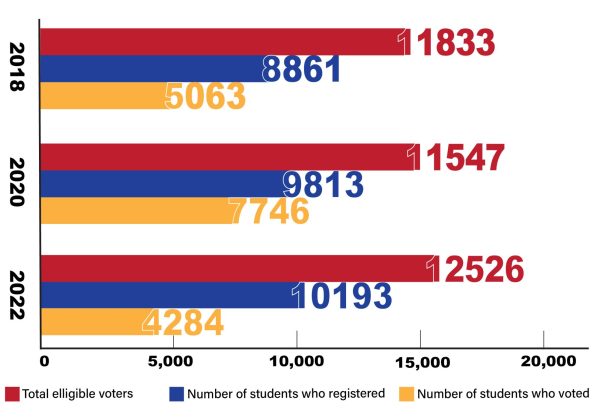College for residents vs. non-residents
College campuses are home to students from a variety of backgrounds and living situations. Wichita State is no different.
On any given campus, one can expect to find students from all over the country and even the world. Some students live on campus, and some make a daily commute.
Students who live in Kansas are eligible for in-state tuition. Students considered in-state residents will pay a cheaper tuition rate, around $195 per credit hour for the 2014-15 school year, around $100 less than out-of-state students.
On WSU’s campus, many students are from Wichita and the surrounding areas. While some may argue that going to school so close to home takes away from the “college experience,” the students who actually make this decision don’t always tend to see it that way. Boi Tran, a junior who has lived in Wichita her entire life, is glad to be attending a school that isn’t far away from home.
“To me, college is college. It doesn’t matter where you’re at,” Tran said.
The atmosphere at WSU is completely different than the city itself, Tran said. She said that while the city is the home of the university, the campus has an energy that cannot be replicated. Students who have lived in Wichita their entire lives can come to the university and be totally immersed in a new environment, she thinks.
Out-of-state students who come from across the country can expect to pay around $200 more per credit hour than an in-state student. Multiply that number by at least 12 credit hours, add fees, books, a meal plan and either rent or dorm fees, and that becomes a big number.
Junior Joseph Shepard is from California and pays the much higher tuition rate, along with keeping up with his phone bill, rent, utilities and gas for his car.
Out-of-state students face an almost overwhelming amount of bills and fees. Aside from paying less to attend school, Shepard says he wouldn’t change his situation.
“I love not being from here,” he said. “It allows me to share incorporated ideas from back home into a new and different environment.”
Out-of-state students are able to experience life in a different city and state. This exposes them to a whole new set of cultural norms and values in some situations. The adjustment may be difficult, but the opportunities for learning and personal growth are abundant.
Some WSU students are not from Kansas, but don’t have to pay the significantly higher non-resident tuition.
Kansas participates in the Midwest Student Exchange Program, which is intended to improve access to higher education for students of the Midwest. It is the largest multi-state tuition cooperation program in the Midwest.
Public institutions that participate in MSEP agree to charge students no more than 150 percent of the in-state tuition rate. Private universities agree to give MSEP students a 10 percent discount.
MSEP students enjoy the discount they receive on tuition, and they still get the experience of leaving home. It seems they are getting the best of both worlds. However, they still have to deal with being homesick and adjusting to a new city and environment.
Tran and Shepard commute to WSU. This means they must make a daily commute to campus for class, work and other school-related activities.
Students who commute must deal with trying to find parking spots on a campus that doesn’t have the best parking availability. They also have to get up earlier to make it to campus on time.
Perhaps one of the biggest complaints about students who commute is gasoline. They must make multiple trips to campus in a week and sometimes a day. Gas is not the cheapest it’s ever been, and those trips add up.
While some would prefer to live on campus, Tran and Shepard do not. Tran enjoys living at home with her family. It’s free, and she gets to eat her mother’s delicious food every day,
Shepard said he enjoys the independence of living in his own apartment.
Parking may still be a concern for students who live on campus, but they have the option of walking to avoid parking frustrations.
On campus students can roll out of bed and head to class, if they so choose. This does not necessarily mean they have it easy. Students who live in campus housing have their own complaints, such as living with a loud or annoying roommate, sharing a bathroom and having to follow the residence hall rules.
Essentially, all students have a few complaints about their living or driving situations in college. Most recognize that the situations are temporary and focus on making the most of their experience.
There is more than one way to experience college. The experience is unique depending on each student’s background and campus involvement. No matter where you come from and no matter where you’re going, don’t forget the experience while you’re here.








